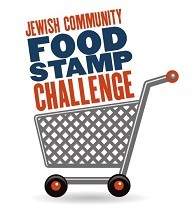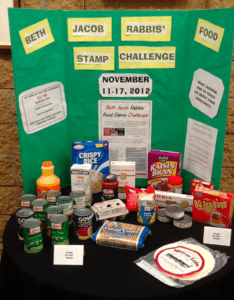What would you eat if you had only $1.50 to spend on groceries per meal, with no money to dine out? Several Twin Cities area rabbis, and other clergy, will have that experience Nov. 11 – Nov. 18 as they participate in a Food Stamp Challenge to help raise awareness about hunger and possible cuts facing the federal food stamp program. 
For the clergy, this is one week, but for some 45.7 million Americans enrolled in the Supplemental Nutrition Assistance Program (federal food stamps), this is their life for months, or even years at a time.
“Unfortunately there are all too many people for whom this is not a weekly reality but a yearlong reality or a life reality,” says Rabbi Morris Allen of Beth Jacob Congregation, who is participating in the challenge. “My wife and I went to the store to scope out what $31.50 buys and how we will handle our ongoing responsibilities in the life of our shul and inviting guests for Shabbas and how we will all make it work.”
Weekly Allotment Averages $31.50
Although the SNAP food stamp program is meant to be supplemental, for many recipients it is their entire food budget. Food stamps, a misnomer these days given that the funds are distributed electronically in a form similar to a debit card, have an average allotment of $31.50 per week, distributed monthly, which amounts to $1.50 per meal.
The same amount is given to those facing food restrictions such as keeping kosher or needing gluten-free foods. Specialty food items tend to be more expensive, making living in poverty even more challenging for such families.
“This challenge informs us that we really have no idea what it would be like to live in poverty, to worry all week about whether we’ll have enough money to feed our children, much less buy the healthy foods we prefer,” says coordinator Rabbi Amy Eilberg of the Jay Phillips Center for Interfaith Learning at the University of St. Thomas.
Glimpse into Another’s Life
“Through this imaginative leap into the life of a SNAP recipient, we gain a tiny glimpse of the experience of food insecurity, that afflicts millions of Americans of all ages, races, religions, and educational backgrounds,” says Rabbi Eilberg.
“We know that hunger is a very real issue for many families across the nation and right here in Minnesota. Many people, including many children and seniors, struggle every day without enough to eat, but not everyone can relate to what that means,” says Rabbi Harold Kravitz, senior rabbi, Max Newman Family Chair in Rabbnics at Adath Jeshurun Congregation.
“Adath Jeshurun has long worked through our Hesed (social action) Committee to alleviate hunger. We have long-time partnerships nationally with MAZON: A Jewish Response to Hunger and locally with the STEP and ICA Food shelves, to which we regularly bring food, and with the Shelter at Our Saviors and Loaves and Fishes of MN, where we serve meals once a month,” says Rabbi Kravitz, who is Chair of the Board of MAZON.
Jews Have Commitment to Help
Rabbi Aaron Weininger, an assistant rabbi at Adath, shot a short video inside of a local grocery store about the Food Stamp Challenge, tied into Parsha Vayera:
httpv://www.youtube.com/watch?v=Mytu365u-0A
The Jewish community’s commitment to ending poverty is encapsulated in the Torah, where it is commanded, “If there is among you a poor man, one of your brethren… you shall not harden your heart or shut your hand against your poor brother” (Deuteronomy 15:7).
Rabbi Adam J. Titcher, an assistant rabbi at Adath, says he is participating in this challenge because, “I need to understand first hand what individuals experience when they live off food stamps so I can raise awareness with a stronger focus. There are many impoverished individuals and families in my greater community and as a religious leader I am a partner to help guide my community to end hunger where it is found and help those who desperately need it.” 
Although many clergy will go shopping together at an area Cub Foods on Sunday November 11, Rabbi Lynn Liberman, Beth Jacob’s director of congregational learning, says she has already spent an afternoon buying $31.50 worth of food for a week and has items on display in the Beth Jacob lobby.
“I made that shopping experience very narrow, and thought about what if I had to carry all of this home if I didn’t have a car.” she says. “There are many aspects to consider for people who are food insecure. A lot of food is bought by people in their neighborhood [at convenience stores or neighborhood shops] even if the prices aren’t good, because they may not have gas to put in their car, or because they shop within walking distance to home or a bus route because they just can’t get that much farther to a grocery store.”
Public Events Sundays Nov. 11 and Nov. 18
The public is invited to learn more about the challenges of families using SNAP, as well as how the program is facing steep cuts along with many other federal feeding programs in the federal fiscal year 2012 budget.
Today, November 11, from 2:00-4:00 PM: Join the Food Stamp Challenge and the rabbis and other clergy at Holy Trinity Lutheran Church 2730 East 31st Street, Minneapolis. They will walk from there to a local Cub Foods to do their shopping. Or join them November 18 from 10 AM-12:30 PM to prepare and serve food for families at The Family Place at 244 10th St. East, St. Paul, followed at 12:30-2:30 PM at First Baptist Church, 499 N. Wacouta St., St. Paul for a chance to learn from experts about how to combat hunger in Minnesota.

*The title of this post originally referred to the challenge being $1.50 for food per day. It has been updated to reflect the actual challenge of $1.50 per meal.

